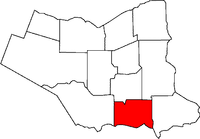Port Colborne, Ontario
| Port Colborne | |
|---|---|
| City (lower-tier) | |
| City of Port Colborne | |
![Former bank building on West Street in Port Colborne[1]](http://upload.wikimedia.org/wikipedia/commons/thumb/a/a7/PortColborneBank.jpg/250px-PortColborneBank.jpg)
Former bank building on West Street in Port Colborne
|
|
 Location of Port Colborne in the Niagara Region |
|
| Location in southern Ontario | |
| Coordinates: 42°53′N 79°15′W / 42.883°N 79.250°WCoordinates: 42°53′N 79°15′W / 42.883°N 79.250°W | |
| Country |
|
| Province |
|
| Region | Niagara |
| Settled | 1830s |
| Incorporated | 1870 (village) |
| 1966 (city) | |
| Government | |
| • Mayor | John Maloney |
| • MP | Vance Badawey (Liberal) |
| • MPP | Cindy Forster (NDP) |
| Area | |
| • Land | 121.97 km2 (47.09 sq mi) |
| Elevation | 175.30 m (575.13 ft) |
| Population (2011) | |
| • Total | 18,424 |
| • Density | 151.1/km2 (391/sq mi) |
| Time zone | EST (UTC-5) |
| • Summer (DST) | EDT (UTC-4) |
| Area code(s) | 905, 289, 365 |
| Website | city.portcolborne.on.ca |
Port Colborne (2011 population 18,424) is a city on Lake Erie, at the southern end of the Welland Canal, in the Niagara Region of southern Ontario, Canada. The original settlement, known as Gravelly Bay, dates from 1832 and was renamed after Sir John Colborne, a British war hero and the Lieutenant Governor of Upper Canada at the time of the opening of the (new) southern terminus of the First Welland Canal in 1833.
In pre-colonial times, the Neutral Indians lived in the area, due in part to the ready availability of flint and chert from outcroppings on the Onondaga Escarpment. This advantage was diminished by the introduction of firearms by European traders, and they were driven out by the Iroquois around 1650 as part of the Beaver Wars.
Originally called Gravelly Bay, after the shallow, bedrock-floored bay upon which it sits, the modern City of Port Colborne traces its roots back to the United Empire Loyalist settlements that grew up in the area following the American Revolution. Growth became focused around the southern terminus of the Welland Canal after it was extended to reach Lake Erie in 1833. As the population rose, Port Colborne was incorporated as a village in 1870, became a town in 1918, merged with the neighbouring Village of Humberstone in 1952, and was re-incorporated as a city in 1966. In 1970, Niagara Region municipal restructuring added Humberstone Township, further expanding the city.
...
Wikipedia

